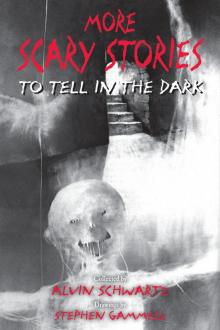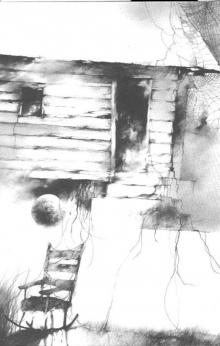- Home
- Alvin Schwartz
Scary Stories to Tell in the Dark Page 3
Scary Stories to Tell in the Dark Read online
Page 3
Sometime during the night he heard a car turn into the driveway. He went to the window to see who was arriving at such a late hour. In the moonlight, he saw a long, black hearse filled with people.
The driver of the hearse looked up at him. When Blackwell saw his queer, hideous face, he shuddered. The driver called to him, "There is room for one more." Then he waited for a minute or two, and he drove off. In the morning Blackwell told his friends what had happened. "You were dreaming," they said.
"I must have been," he said, "but it didn't seem like a dream."
After breakfast he went into Philadelphia. He spent the day high above the city in one of the new office buildings there.
Late in the afternoon he was waiting for an elevator to take him back down to the street. But when it arrived, it was very crowded. One of the passengers looked out and called to him. "There is room for one more," he said. It was the driver of the hearse.
"No, thanks," said Blackwell. "I'll get the next one." The doors closed, and the elevator started down. There was shrieking and screaming, then the sound of a crash. The elevator had fallen to the bottom of the shaft. Everyone aboard was killed.
THE WENDIGO
A wealthy man wanted to go hunting in a part of northern Canada where few people had ever hunted. He traveled to a trading post and tried to find a guide to take him But no one would do it. It was too dangerous, they said.
Finally, he found an Indian who needed money badly. and he agreed to take him. The Indian's name was DeFago.
They made camp in the snow near a large frozen lake. For three days they hunted, but they had nothing to show for it. The third night a windstorm came up. They lay in their tent listening to the wind howling and the trees whipping back and forth.
To see the storm better, the hunter opened the tent flap. What he saw startled him. There wasn't a breath of air. stirring, and the trees were standing perfectly still. Yet he could hear the wind howling. And the more he listened, the more it sounded as if it were calling DeFago's name.
''Da-faaaaaaaaay-gol'' it called. ''Da-faaaaaaaaay-gol''
"I must be losing my mind," the hunter thought.
But DeFago had gotten out of his sleeping bag. He was huddled in a corner of the tent, his head buried in his arms.
''What's this all about?'' the hunter asked.
''It's nothing,'' DeFago said.
But the wind continued to call to him. And DeFago became more tense and more restless.
''Da-Faaaaaaaaay-go!'' it called. ''Da-faaaaaaaaay-go!'' Suddenly, he jumped to his feet, and he began to run from the tent. But the hunter grabbed him and wrestled him to the ground.
''You can't leave me out here," the hunter shouted.
Then the wind called again, and DeFago broke loose and ran into the darkness. The hunter could hear him screaming as he went. Again and again he cried, "Oh, my fiery feet, my burning feet of fire... '' Then his voice faded away, and the wind died down.
At daybreak, the hunter followed DeFago's tracks in the snow. They went through the woods, down toward the lake, then out onto the ice.
But soon he noticed something strange. The steps DeFago had taken got longer and longer. They were so long no human being could have taken them. It was as if something had helped him to hurry away.
The hunter followed the tracks out to the middle of the lake, but there they disappeared. At first, he thought that DeFago had fallen through the ice, but there wasn't any hole. Then he thought that something had pulled him off the ice into the sky. But that made no sense.
As he stood wondering what had happened, the wind picked up again. Soon it was howling as it had the night before. Then he heard DeFago's voice. It was coming from up above, and again he heard DeFago screaming, ''... My fiery feet, my burning feet ...'' But there was nothing to be seen.
Now the hunter wanted to leave that place as fast as he could. He went back to camp and packed. Then he left some food for DeFago, and he started out. Weeks later he reached civilization.
The following year he went back to hunt in that area again. He went to the same trading post to look for a guide. The people there could not explain what had happened to DeFago that night. But they had not seen him since then.
''Maybe it was the Wendigo,'' one of them said, and he laughed. ''It's supposed to come with the wind. It drags you along at great speed until your feet are burned away, and more of you than that. Then it carries you into the sky, and it drops you. It's just a crazy story, but that's what some of the Indians say."
A few days later the hinter was at the trading post again. An Indian came in and sat by the fire. He had a blanket wrapped around him, and he wore his hat so that you couldn't see his face. The hunter thought there was something familiar about him.
He walked over and he asked, ''Are you DeFago?" The Indian didn't answer.
''Do you know anything about him?" No answer.
He began to wonder if something was wrong, if the man needed help. But he couldn't see his face.
''Are you all right?" he asked.
No answer.
To get a look at him, he lifted the Indian's hat. Then he screamed. There was nothing under the hat but a pile of ashes.
This scary story is a scary game that people play at Hallowe'en. But it can be played whenever the spirit moves you.
The players sit in a circle in a darkened room and listen to a storyteller describe the rotting remains of a corpse. Each part is passed around for them to feel.
In one version, a player is out if he or she screams or gasps with fright. In another version, everybody stays to the end, no matter how scared they get.
Here is the story:
Once in this town there lived a man named Brown. It was years ago, on this night, that he was murdered out of spite.
We have here his remains.
First, let's feel his brains. (A wet, squishy tomato)
Now here are his eyes, still frozen with surprise. (Two peeled grapes)
This is his nose. (A chicken bone)
Here is his ear. (A dried apricot)
And here is his hand, rotting flesh and bone. (A cloth or rubber glove filled with mud or ice)
But his hair still grows. (A handful of corn silk or wet fur or yarn)
And his heart still beats, now and then. (A piece of raw liver)
And his blood still flows. Dip your fingers in it. It's nice and warm. (A bowl of catsup thinned with warm water)
That's all there is, except for these worms. They are the ones that ate the rest of him. (A handful of wet, cooked spaghetti noodles)
"MAY I CARRY YOUR BASKET?"
Sam Lewis spent the evening playing chess at his friend's house. It was about midnight when they finished their game, and he started home. Outside it was icy cold and as quiet as the grave.
As he came around a turn in the road, he was surprised to see a woman walking ahead of him. She was carrying a basket covered with a white cloth. When he caught up to her, he looked to see who it was. But she was so bundled up against the cold, it was hard to see her face.
"Good evening," Sam said. "What brings you out so late?"
But she didn't answer.
Then he said, "May I carry your basket?"
She handed it to him. From under the cloth, a small voice said, "That's very nice of you," and that was followed by wild laughter.
Sam was so startled that he dropped the basket and out rolled a woman's head. He looked at the head, and he stared at the woman. "It's her head!" he cried. And he started to run, and the woman and her head began to chase him.
Soon the head caught up to him. It bounded into the air and sunk its teeth into his left leg. Sam screamed with pain and ran faster.
But the woman and her head stayed right behind. Soon the head leaped into the air again and bit into his other leg. Then they were gone.
OTHER DANGERS
Most of the scary stories in this book have been passed down the years. But the ones in this chapter have been told only
in recent times. They are stories that young people often tell about dangers we face in our lives today.
Donald and Sarah went to the movies. Then they went for a ride in Donald's car. They parked up on a hill at the edge of town. From there they could see the lights up and down the valley.
Donald turned on the radio and found some music. But an announcer broke in with a news bulletin. A murderer had escaped from the state prison. He was armed with a knife and was headed south on foot. His left hand was missing. In its place, he wore a hook.
"Let's roll up the windows and lock the doors," said Sarah.
"That's a good idea," said Donald.
"That prison isn't too far away," said Sarah. "Maybe we really should go home."
"But it's only ten o'clock," said Donald.
"I don't care what time it is," she said. "I want to go home."
"Look, Sarah," said Donald, "he's not going to climb all the way up here. Why would he do that? Even if he did, all the doors are locked. How could he get in?"
"Donald, he could take that hook and break through a window and open a door," she said. "I'm scared. I want to go home." Donald was annoyed. "Girls always are afraid of something," he said.
As he started the car, Sarah thought she heard someone, or something, scratching at her door.
"Did you hear that?" she asked as they roared away. "It sounded like somebody was trying to get in.
"Oh, sure" said Donald.
Soon they got to her house.
"Would you like to come in and have some cocoa?" she asked.
"No," he said, "I've got to go home."
He went around to the other side of the car to let her out. Hanging on the door handle was a hook.
THE WHITE SATIN EVENING GOWN
A young man invited a young woman to a formal dance. But she was very poor, and she could not afford to buy the evening gown she needed for such an occasion.
"Maybe you can rent a dress/' her mother said. So she went to a pawnshop not far from where she lived. There she found a white satin evening gown in her size. She looked lovely in it, and she was able to rent it for very little.
When she arrived at the dance with her friend, she was so attractive, everyone wanted to meet her. She danced again and again and was having a wonderful time. But then she began to feel dizzy and faint, and she asked her friend to take her home. "I think I have danced too much," she told him.
When she got home, she lay down on her bed. The next morning her mother found that her daughter had died. The doctor did not understand what had caused her death. So he had the coroner perform an autopsy.
The coroner found that she had been poisoned by em- balming fluid. It had stopped her blood from flowing. There were traces of the fluid on her dress. He decided it had entered her skin when she perspired while she was dancing.
The pawnbroker said he bought the dress from an undertaker's helper. It had been used in a funeral for another young woman, and the helper had stolen it just before she was buried.
The girl driving the old blue sedan was a senior at the high school. She lived on a farm about eight miles away and used the car to drive back and forth.
She had driven into town that night to see a basketball game. Now she was on her way home. As she pulled away from the school, she noticed a red pick-up truck follow her out of the parking lot. A few minutes later the truck was still behind her.
"I guess we're going in the same direction," she thought.
She began to watch the truck in her mirror. When she changed her speed, the driver of the truck changed his speed. When she passed a car, so did he.
Then he turned on his high beams, flooding her car with light. He left them on for almost a minute. "He probably wants to pass me," she thought. But she was becoming uneasy.
Usually she drove home over a back road. Not too many people went that way. But when she turned onto that road, so did the truck.
"I've got to get away from him," she thought, and she began to drive faster. Then he turned his high beams on again. After a minute, he turned them off. Then he turned them on again and off again.
She drove even faster, but the truck driver stayed right behind her. Then he turned his high beams on again. Once more her car was ablaze with light. "What is he doing?" she wondered. "What does he want?" Then he turned them off again. But a minute later he had them on again, and he left them on.
At last she pulled into her driveway, and the truck pulled in right behind her. She jumped from the car and ran to the house. "Call the police!" she screamed at her father. Out in the driveway she could see the driver of the truck. He had a gun in his hand.
When the police arrived, they started to arrest him, but he pointed to the girl's car. "You don't want me,"he said. "You want him."
Crouched behind the driver's seat, there was a man with a knife.
As the driver of the truck explained it, the man slipped into the girl's car just before she left the school. He saw it happen, but there was no way he could stop it. He thought about getting the police, but he was afraid to leave her. So he followed her car.
Each time the man in the back seat reached up to over- power her, the driver of the truck turned on his high beams. Then the man dropped down, afraid that someone might see him.
It was nine o'clock in the evening. Everybody was sitting on the couch in front of the TV. There were Richard, Brian, Jenny, and Doreen, the babysitter.
The telephone rang.
Maybe it's your mother," said Doreen. She picked up the phone. Before she could say a word, a man laughed hysterically and hung up.
"Who was it?" asked Richard.
"Some nut," said Doreen. "What did I miss?"
At nine-thirty the telephone rang again. Doreen an-swered it. It was the man who had called before. "I'll be there soon," he said, and he laughed and hung up.
"Who was it?" the children asked.
"Some crazy person," she said.
About ten o'clock the telephone rang again. Jenny got to it first.
"Hello," she said.
It was the same man. "One more hour," he said, and he laughed and hung up.
"He said, 'One more hour.' What did he mean?" asked Jenny.
"Don't worry," said Doreen. "It's somebody fooling around."
"I'm scared," said Jenny.
About ten-thirty the telephone rang once more. When Doreen picked it up, the man said, "Pretty soon now," and he laughed.
"Why are you doing this?" Doreen screamed, and he hung up.
"Was it that guy again?" asked Brian.
"Yes," said Doreen. "I'm going to call the operator and complain."
The operator told her to call back if it happened again, and she would try to trace the call.
At eleven o'clock the telephone rang again. Doreen answered it. "Very soon now," the man said, and he laughed and hung up.

 More Scary Stories to Tell in the Dark
More Scary Stories to Tell in the Dark Scary Stories to Tell in the Dark
Scary Stories to Tell in the Dark Scary Stories Complete Set
Scary Stories Complete Set